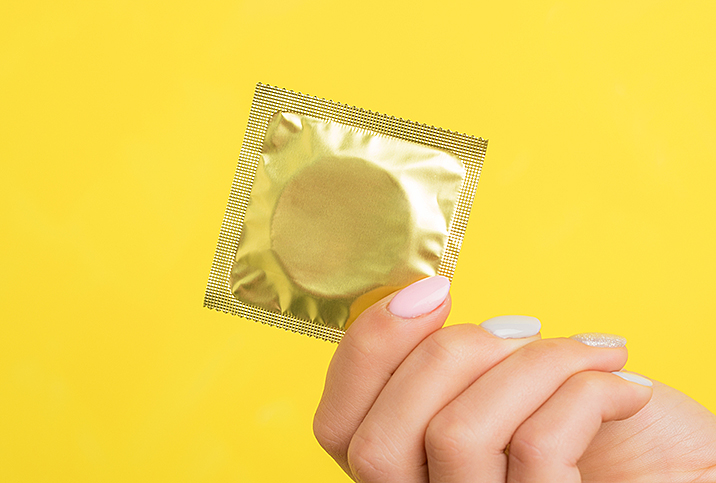How to Make Talking About Safe Sex Sexier

If you want to prevent an unwanted pregnancy or avoid receiving or spreading a sexually transmitted infection (STI) or sexually transmitted disease (STD), then it remains essential to practice safe sex.
The most recent data from the Centers for Disease Control and Prevention (CDC) indicated that STDs are on the rise in many demographics, especially some racial and ethnic minority groups, gay and bisexual men, as well as young people generally. According to the CDC, this trend is a result of multiple factors, including discrimination, stigma and lack of access to regular medical care.
While practicing safe sex is necessary for protecting your sexual health, for many people, it remains awkward to broach the topic with a potential partner before a sexual encounter. This awkwardness could be due to the casual nature of your relationship with that person or just because talking frankly about the mechanics of your sex life outside of an intimate situation makes you uncomfortable.
"Conversations about safer sex can definitely be daunting, especially with a new or casual partner," said Amanda Bule, a sex educator and reproductive rights advocate who works as an abortion patient navigator at Planned Parenthood in Pennsylvania. "I think something important to keep in mind is that these conversations don't need to be brought up in a negative, restrictive way."
Planned Parenthood and other organizations often use the phrase "safer sex" because no type of sex with a partner can be guaranteed 100 percent safe. Safer sex refers to any steps taken to lower your risk and your partner's risk of STIs.
Putting your mind at peace
Talking about how you intend to have protected sex with a partner lays the groundwork for a safer encounter, but getting rid of any uncertainty beforehand can help you to relax and enjoy the intimacy as it unfolds without worrying about having to interrupt the flow to figure out if one of you brought protection.
"It can be much easier to have a pleasurable sexual experience if your mind is put at ease with barrier methods," Bule said.
Having the conversation ahead of an intimate situation can help you avoid any potential for being too caught up in the moment and proceeding without protection, and the possibility of regretting that decision later.
"To ensure you and your partner are having the most consensual, pleasurable sexual experiences, consider engaging in a conversation about it outside the bedroom or wherever you choose to have sex," she suggested. "It's also important to first understand what you want as an individual, so you can come to the conversation with your partner prepared to authentically explain what you're looking for, rather than experiencing coercion into a sexual experience you may not be entirely comfortable with. Consent should be enthusiastic."
Jennifer Scott, Ph.D., M.P.H., a public health professional who specializes in comprehensive sex education for individuals of all ages in Texas, pointed out that regular testing is an important part of having safer sex.
"Discuss the last time your partner has been tested for STIs and what type of protection you all will use," Scott said. "Determine whose responsibility it is to bring the protection and any other items that you all would like to have to increase comfort, such as a lubricant. The discussion should be two-way communication."
It's important to be intentional about this conversation, setting aside the right space and time to have it.
"Create a safe space, with uninterrupted time, for both of you to share your honest feelings about the subject," Scott added. "This is an important discussion, not an argument, so approach it as such. If you are nervous, let your partner know. It may help to even jot down a few thoughts of things you want to cover. These things may seem a bit obvious, but talking about them prior to the interaction can remove a bit of the stress of the unknown."
And now…let's make it sexy
Talking about how to keep each other safe during sex can create a feeling of emotional intimacy and security between you and your partner. But actually practicing safer sex in the bedroom can be exciting, too—you just have to be creative.
Aside from getting regularly tested for STIs, condoms and dental dams are useful tools to have in your safe sex toolkit. Condoms can provide protection during penetrative sex or oral sex involving the penis. To add more sensuality, consider offering to put the condom on your partner yourself.
A dental dam is a latex or polyurethane sheet placed as a protective barrier between the mouth and vagina or the mouth and the anus during oral sex.
"Like condoms, dental dams are a one-time use product," Scott said. "Ensure that the dental dam has not expired and has no rips or tears in it. Using appropriate lube can increase pleasure and decrease the likelihood of breaking mid-use. The dental dam should cover the entire vulva area—the vaginal opening—or anus depending on where the oral exchange will take place. Do not cross-contaminate between the two areas. When done, simply toss the dental dam in the trash."
Dental dams are a relatively straightforward item to use properly, Bule said.
"It can be as easy as placing the material over the receiver's genitals and then holding it in place," Bule said. "Lube can be a great addition as well. To introduce lube into the mix, simply use a bit on the side that will contact the receiver's genitals."
By the way, if you've never heard of or have only a vague knowledge of dental dams, you're not alone.
"The emphasis on condom use versus dental dam use has to do with the focus of pregnancy prevention in sex ed classes," Bule explained. "While pregnancy prevention is very important for some people, focusing solely on this topic creates a heteronormative model of sex and relationships, as well as neglecting the discussion of pleasure. Discussing dental dams in education acknowledges that sex can happen without a penis and for the sole purpose of experiencing pleasure."
Both dental dams and condoms can be purchased in a variety of flavors to make things a little more fun.
"Safer sex is sexy, and when you and your partner prioritize each other's health, you can have a more comfortable and enjoyable experience," Scott said.
Protecting yourself and your partner during sex can be sexy and fun, and should be.
"There are even dental dams that look like a regular pair of underwear and can be a great alternative if holding the dental dam in place is not an option," Bule said. "Framing the conversation around pleasure, curiosity and novelty are all great ways of introducing safer oral sex."


















